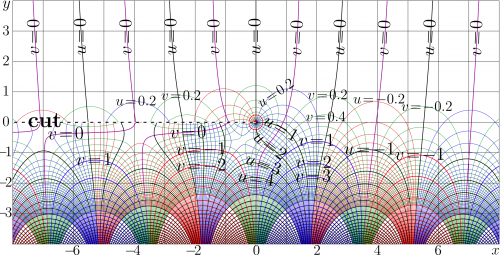Difference between revisions of "BesselH0"
| Line 1: | Line 1: | ||
[[File:BesselY0J0J1plotT060.png|500px|thumb|Real and imaginary parts of $H_0(x)$ for $x>0$ compared to [[BesselJ1]] (green)]] |
[[File:BesselY0J0J1plotT060.png|500px|thumb|Real and imaginary parts of $H_0(x)$ for $x>0$ compared to [[BesselJ1]] (green)]] |
||
[[File:Besselh0mapT100.png|500px|thumb|$u+\mathrm i v=H_0(x+\mathrm i y)$ ]] |
[[File:Besselh0mapT100.png|500px|thumb|$u+\mathrm i v=H_0(x+\mathrm i y)$ ]] |
||
| − | [[BesselH0]] |
+ | [[BesselH0]]$(z)=H_0(z)\!=$[[HankelH1]]$[0,z]$ is the [[Cylindric function]] H (called also the [[Hankel function]]) of zero order. |
BesselH0 is related with $J_0=$[[BesselJ0]] and $J_0=$[[BesselY0]] with simple relation |
BesselH0 is related with $J_0=$[[BesselJ0]] and $J_0=$[[BesselY0]] with simple relation |
||
| Line 13: | Line 13: | ||
Below, the [[complex map]] of $H_0$ is plotted, $u+\mathrm i v=H_0(x+\mathrm i y)$. |
Below, the [[complex map]] of $H_0$ is plotted, $u+\mathrm i v=H_0(x+\mathrm i y)$. |
||
| + | |||
| + | ==Asymptotic expansions== |
||
| + | |||
| + | TeXForm[Expand[Series[(HankelH1[0, x]) (Pi I x/2)^(1/2), {x, Infinity, 5}]]] |
||
| + | |||
| + | does |
||
| + | |||
| + | $e^{i x} \left(1-\frac{i}{8 x}-\frac{9}{128 x^2}+\frac{75 |
||
| + | i}{1024 x^3}+\frac{3675}{32768 x^4}-\frac{59535 |
||
| + | i}{262144 |
||
| + | x^5}+O\left(\left(\frac{1}{x}\right)^6\right)\right)$ |
||
| + | |||
| + | ===Square of BesselH0=== |
||
| + | Some expansions of square of [[BesselH0]] look counter-intuitive and require analysis. |
||
| + | One example ix copy pasted below. |
||
| + | |||
| + | TeXForm[Expand[Series[(HankelH1[0, x])^2 Pi I x/2, {x, Infinity, 5}]]] |
||
| + | |||
| + | does |
||
| + | |||
| + | $e^{2 i x} \left(1-\frac{i}{4 x}-\frac{5}{32 x^2}+\frac{21 |
||
| + | i}{128 x^3}+\frac{507}{2048 x^4}-\frac{4035 i}{8192 |
||
| + | x^5}+O\left(\left(\frac{1}{x}\right)^6\right)\right)$ |
||
| + | |||
| + | and |
||
| + | |||
| + | TeXForm[Expand[Series[(HankelH1[0, x^(1/2)])^2 Pi I x^(1/2)/2, {x, Infinity, 2}]]] |
||
| + | |||
| + | does |
||
| + | |||
| + | $e^{2 i \sqrt{x}} \left(1-\frac{1}{4} i |
||
| + | \sqrt{\frac{1}{x}}-\frac{5}{32 x}+\frac{21}{128} i |
||
| + | \left(\frac{1}{x}\right)^{3/2}+\frac{381}{16384 |
||
| + | x^2}-\frac{675 i |
||
| + | \left(\frac{1}{x}\right)^{5/2}}{65536}+O\left(\left(\frac{1}{x}\right)^3\right)\right) |
||
| + | $ |
||
| + | |||
| + | At least one of these two asymptotic expansions seems to be wrong. Perhaps, the last one, because |
||
| + | |||
| + | TeXForm[Expand[Series[(HankelH1[0, x^(1/2)])^2 Pi I x^(1/2)/2, {x, Infinity, 3}]]] |
||
| + | |||
| + | does |
||
| + | |||
| + | $e^{2 i \sqrt{x}} \left(1-\frac{1}{4} i |
||
| + | \sqrt{\frac{1}{x}}-\frac{5}{32 x}+\frac{21}{128} i |
||
| + | \left(\frac{1}{x}\right)^{3/2}+\frac{507}{2048 |
||
| + | x^2}-\frac{5025 i |
||
| + | \left(\frac{1}{x}\right)^{5/2}}{131072}-\frac{44325}{2 |
||
| + | 097152 x^3}+\frac{275625 i |
||
| + | \left(\frac{1}{x}\right)^{7/2}}{16777216}+O\left(\left |
||
| + | (\frac{1}{x}\right)^4\right)\right)$ |
||
| + | |||
| + | Correcting the two terms (that showes deviation in the previous example); however, two new wrong terms are added. The control on the precision seems to be lost, because |
||
| + | |||
| + | TeXForm[Expand[Series[(HankelH1[0, x^(1/2)])^2 Pi I x^(1/2)/2, {x, Infinity, 4}]]] |
||
| + | |||
| + | does |
||
| + | |||
| + | $e^{2 i \sqrt{x}} \left(1-\frac{1}{4} i |
||
| + | \sqrt{\frac{1}{x}}-\frac{5}{32 x}+\frac{21}{128} i |
||
| + | \left(\frac{1}{x}\right)^{3/2}+\frac{507}{2048 |
||
| + | x^2}-\frac{4035 i |
||
| + | \left(\frac{1}{x}\right)^{5/2}}{8192}-\frac{163395}{20 |
||
| + | 97152 x^3}+\frac{50715 i |
||
| + | \left(\frac{1}{x}\right)^{7/2}}{1048576}+\frac{4922662 |
||
| + | 5}{1073741824 x^4}-\frac{218791125 i |
||
| + | \left(\frac{1}{x}\right)^{9/2}}{4294967296}+O\left(\left(\frac{1}{x}\right)^5\right)\right)$ |
||
| + | |||
| + | This phenomenon can be interpreted as bug in Mathematica [[Series]] routine. |
||
==References== |
==References== |
||
Revision as of 06:58, 1 December 2018

BesselH0$(z)=H_0(z)\!=$HankelH1$[0,z]$ is the Cylindric function H (called also the Hankel function) of zero order.
BesselH0 is related with $J_0=$BesselJ0 and $J_0=$BesselY0 with simple relation
- $H_0(z)=J_0(z)+\mathrm i Y_0(z)$
In particular, for $x>0$, the relations $\Im(J_0(x))=0$ and $\Im(Y_0(x))=0$ hold, and, therefore,
- $\Re(H_0(x))=J_0(x)$
- $\Im(H_0(x))=Y_0(x)$
The explicit plot of real and imaginary parts of BesselH0 versus real positive argument are shown in the upper right corner.
Below, the complex map of $H_0$ is plotted, $u+\mathrm i v=H_0(x+\mathrm i y)$.
Asymptotic expansions
TeXForm[Expand[Series[(HankelH1[0, x]) (Pi I x/2)^(1/2), {x, Infinity, 5}]]]
does
$e^{i x} \left(1-\frac{i}{8 x}-\frac{9}{128 x^2}+\frac{75
i}{1024 x^3}+\frac{3675}{32768 x^4}-\frac{59535
i}{262144
x^5}+O\left(\left(\frac{1}{x}\right)^6\right)\right)$
Square of BesselH0
Some expansions of square of BesselH0 look counter-intuitive and require analysis. One example ix copy pasted below.
TeXForm[Expand[Series[(HankelH1[0, x])^2 Pi I x/2, {x, Infinity, 5}]]]
does
$e^{2 i x} \left(1-\frac{i}{4 x}-\frac{5}{32 x^2}+\frac{21
i}{128 x^3}+\frac{507}{2048 x^4}-\frac{4035 i}{8192
x^5}+O\left(\left(\frac{1}{x}\right)^6\right)\right)$
and
TeXForm[Expand[Series[(HankelH1[0, x^(1/2)])^2 Pi I x^(1/2)/2, {x, Infinity, 2}]]]
does
$e^{2 i \sqrt{x}} \left(1-\frac{1}{4} i
\sqrt{\frac{1}{x}}-\frac{5}{32 x}+\frac{21}{128} i
\left(\frac{1}{x}\right)^{3/2}+\frac{381}{16384
x^2}-\frac{675 i
\left(\frac{1}{x}\right)^{5/2}}{65536}+O\left(\left(\frac{1}{x}\right)^3\right)\right)
$
At least one of these two asymptotic expansions seems to be wrong. Perhaps, the last one, because
TeXForm[Expand[Series[(HankelH1[0, x^(1/2)])^2 Pi I x^(1/2)/2, {x, Infinity, 3}]]]
does
$e^{2 i \sqrt{x}} \left(1-\frac{1}{4} i
\sqrt{\frac{1}{x}}-\frac{5}{32 x}+\frac{21}{128} i
\left(\frac{1}{x}\right)^{3/2}+\frac{507}{2048
x^2}-\frac{5025 i
\left(\frac{1}{x}\right)^{5/2}}{131072}-\frac{44325}{2
097152 x^3}+\frac{275625 i
\left(\frac{1}{x}\right)^{7/2}}{16777216}+O\left(\left
(\frac{1}{x}\right)^4\right)\right)$
Correcting the two terms (that showes deviation in the previous example); however, two new wrong terms are added. The control on the precision seems to be lost, because
TeXForm[Expand[Series[(HankelH1[0, x^(1/2)])^2 Pi I x^(1/2)/2, {x, Infinity, 4}]]]
does
$e^{2 i \sqrt{x}} \left(1-\frac{1}{4} i
\sqrt{\frac{1}{x}}-\frac{5}{32 x}+\frac{21}{128} i
\left(\frac{1}{x}\right)^{3/2}+\frac{507}{2048
x^2}-\frac{4035 i
\left(\frac{1}{x}\right)^{5/2}}{8192}-\frac{163395}{20
97152 x^3}+\frac{50715 i
\left(\frac{1}{x}\right)^{7/2}}{1048576}+\frac{4922662
5}{1073741824 x^4}-\frac{218791125 i
\left(\frac{1}{x}\right)^{9/2}}{4294967296}+O\left(\left(\frac{1}{x}\right)^5\right)\right)$
This phenomenon can be interpreted as bug in Mathematica Series routine.
